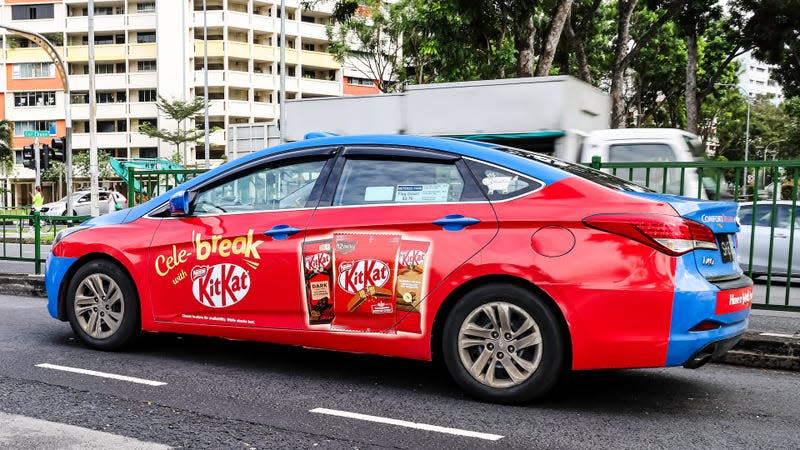If Someone Says They’ll Pay You to Wrap Your Car in Ads, It’s a Scam

While having someone pay you to wrap your car with ads sounds like easy work, there’s a good chance it’ll end up costing you money in the end. So, take it from Uncle Sam: Beware.
In a consumer alert issued this week, the Federal Trade Commission warned the public against so-called “car wrapping scams,” where scammers offer to pay you to shrink-wrap your car with ads for popular brands, such as Monster Energy or Pepsi. As explained by the FTC, the offer sounds good in theory, with many scammers stating that they’ll pay you between $600 and $700 per week to drive your car around with the ad.
If you accept, you’ll soon notice things getting weird. To pay you for driving around a moving ad, the scammer will send you a check, often for much more than what they agreed to pay you, as well as for the cost of “installing” the wrapper on your car. The scammer will tell you to deposit the check, keep your share, and then pay the installer via payment apps, crypto, or bank transfers.
The goal is to get the installer the money quickly, the FTC says.
How car wrapping scams work
But wait, you might ask, how can this possibly be a scam if the check they sent you cleared, and the deposit appeared in your bank account? The agency explains that banks are required to make funds available to you within a few days and that it can take weeks for them to figure out a check is fake.
“When they do, they’ll reverse the transaction and you’ll be stuck repaying the money to the bank while the scammer has the money you sent them,” the FTC said.
In other words, you’ll be paying the scammers from your own pocket. As for the car wrap installer? They don’t exist.
The FTC states that these types of scams often target college students, a group that’s likely not rolling in dough and wouldn’t mind making some extra cash. That doesn’t mean non-students should rest easy, though. Scammers don’t care what profession you have in life. Sometimes, they’ll even place ads offering paid car wrapping gigs in the hope that people will contact them.
A tale of a car wrapping scam
These scams aren’t new: They’ve been around for years. One Reddit user described receiving an email in 2021 from someone who pretended to be the dean of their college offering them $350 per week to wrap their car to promote the Super Bowl. The scammer told the students they would give them gas money, pay to wrap their car, and let them keep the gig for eight weeks for another ad campaign.
“I only started to have suspicions when he told me he was sending a check to cover the car wrapping instead of the company just covering it themselves and sending a guy to me,” the Reddit user said. “I first went to my bank for help. I did a mobile deposit so I still had the check and showed it to the teller. They told me that the check did look fake, and I should cease talking to this scammer immediately.”
In the Reddit user’s case, there were other warning signs, too. The email they received had typos and it included a different signature with every new email. They also received a check for nearly $4,000, “obviously THOUSANDS more than what I was supposed to be paid. He told me to keep the $350 for my payment and use the rest to cover the wrapping.”
According to the FTC, another sign you might be getting scammed is if you receive a message insisting you deposit the fake check as soon as possible to pay the installer and get to work.
“If you get a message urging you to deposit a check and wire money back, it’s a scam. Every time. No matter the story,” the FTC wrote in another consumer alert on car wrapping scams. “And if this were a legitimate car wrap opportunity, wouldn’t the company directly pay the car-wrapping vendor, instead of asking you to do it?”

